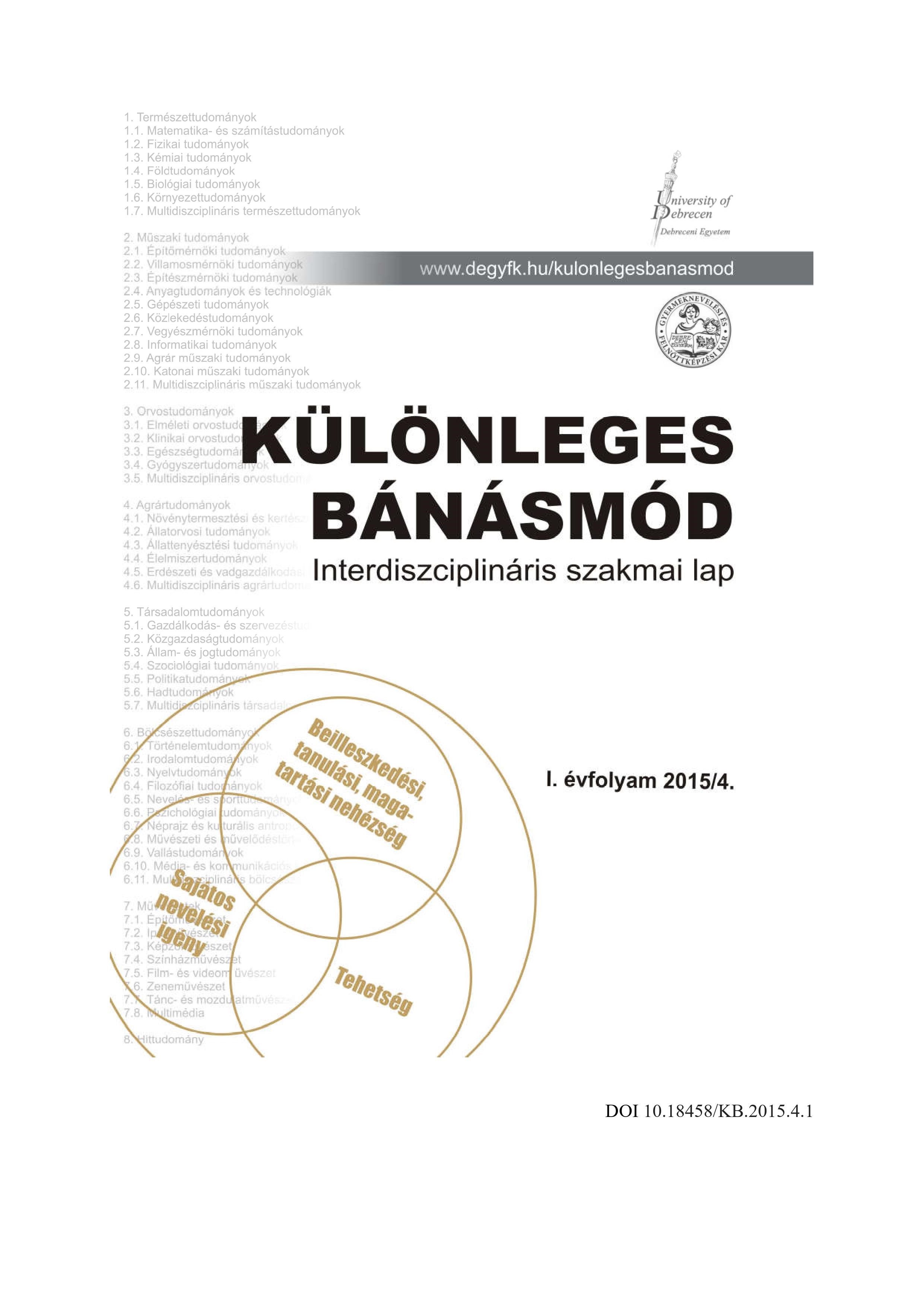Vol. 1 No. 4 (2015)
##issue.tableOfContents##
Articles
-
SPECIAL TREATMENT, 2015. Vol. 1. (4.)
1-105Views:402Special Treatment, 2015. Vol. 1. (4.) - full text
PDF (Hungarian)279
Empirical and Essay Studies
-
TEACHERS' ROLE IN THE TALENT DEVELOPMENT
5-19Views:311This study focuses on teachers who work with gifted and talented students. Its central questions are: What are the distinctive characteristics of these teachers? How can we diagnose these characteristics? Can we develop these characteristics? What special roles have the teachers in case of talent identification and development? These questions have been in the center attention of talent education for more decades, and now, this paper gives a possible answer.
pdf (Hungarian)400 -
„SO THAT WE CAN SEE CLEARLY...!” BLIND YOUNG AND ADULT PEOPLE'S PSYCHOLOGICAL EXAMINATION FROM DIFFERENT POINT OF VIEWS
21-45Views:286This study focuses on the attachment style and anxiety of blind persons in connection with segregating and integrating types of schools, and the age and mode of losing their sight. Sample: 86 blind people (48 female and 38 male, mean age are 37,4 years; SD = 15,4 years), 50% of sample learned in a segregated school, and 50% of them learned in integrated school during their school years. Methods: Relationship Scale Questionnaire, Beck’s Anxiety Inventory, questions about schools, and age and mode of losing sight. Results: blind people show a higher rate of avoiding attachment. There is no significant difference between segregated or integrated education and attachment style and anxiety. The age and mode of losing sight have no effect on these variables.
pdf (Hungarian)613
Methodological Studies
-
EVERYDAY ACTIVITIES TO HELP INTEGRATION IN PETHŐ INSTITUTE IN HUNGARY AND ABROAD
49-64Views:288This paper will present András Pető, the father of the conductive pedagogy, his method, and his institute. His new rehabilitation method gave a chance to motor disordered children and adults to learn how to adjust to society and cope with daily challenges in spite of their physical disadvantage. He established his institute after World War II in 1945, and the institute was named after him and became nationally and internationally well-known as Pető Institute.
pdf (Hungarian)341 -
MATHEMATICAL STATISTICAL BACKGROUND OF SELF-CONTROLLED EFFECTIVENESS STUDY OF DEVELOPMENT PROGRAMMES
65-75Views:497This paper offers methodological guidance to the mathematical-statistical analysis of self-controlled (pre-test - development - post-test type) effectiveness studies of development programs written for children who need special treatment. After summarising the basic terms we show what kind of commands can be given to a downloadable free software (it is the R language), and how we can interpret the results of statistical calculations done by the software.
pdf (Hungarian)260 -
REHABILITATION IN PRACTICE — INDIVIDUAL DEVELOPMENTAL PLAN MODEL
77-100Views:646How can we create individual a development plan, a lesson plan, and a development board? This methodological study shows the sample documents and gives recommendations about the development of general knowledge, attention, vocabulary, linguistic layout, movement and rhythm, counting and measurement, reading and writing, spatial, planar and time orientation, body schema, speech, analytic and synthetic thinking, psychosocial rehabilitation and learning technics.
pdf (Hungarian)909
Invitations
-
INVITATION TO THE 'EARLY CHILDHOOD EDUCATION' INTERNATIONAL SCIENTIFIC CONFERENCE
103-105Views:114Date: 2016. May 25-26.
Place: Debreceni Egyetem Gyermeknevelési és Felnőttképzési Kar (Hajdúböszörmény, Désány István u. 1-9.)

